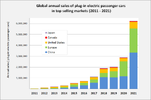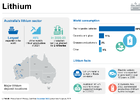JohnDe
La dolce vita
- Joined
- 11 March 2020
- Posts
- 4,614
- Reactions
- 6,835
It doesn't matter what it truly is or isn't. The myth around lithium (whether you believe it or not) is that it is necessary for the green revolution, which virtually all Western governments have subscribed to and legislated targets for.
Too many people caught on the headlights of transition.
Technology is always moving forwards; we can try and stop it but the best we can do is slow it down.
The present technological transition has been in the pipework for over 50 years, the floodgates can't hold back the flow any longer.
Most people, like myself, don't buy an EV or solar panels for the environment. Just like people that keep updating their mobile phones and computers every year or two when there is nothing wrong with their existing model, it is because we love new technology and speed.
The only time I hear people talking about lithium and battery technology being bad for the environment is from people reluctant to follow and keep up with new technology.
People need to stop looking a few yars in front and behind, they need to start looking 20, 30, 40 years both ways. Most of the technology coming out was seen or invented decades ago, we just didn't have the means to make it economically and in large quantity.
In the 1990's, General Motors saw the change coming and prepared for it with the EV1. Sadly, they lost their nerve and scrapped their plan and possibly their future viability.
Tesla's original founding members also saw it, they used the EV1 motors to build their prototypes and sign on investors. With all the leaders of industry saying that Tesla would fail, instead Tesla is now the world's No.1 EV manufacturer.
I am reading about a 'green revolution', but what I see is a new technology revolution and revolution. We are witnessing the beginning of the death of old technology, and the people that still think it is new. The combustion engine has done the job it was designed for, but it is now competing against electric motors that are several times more efficient, less complex and cheaper to design and build.
Lithium is the choice because it is abundant, it is available all over the world, it is relatively easy to source and refine.














